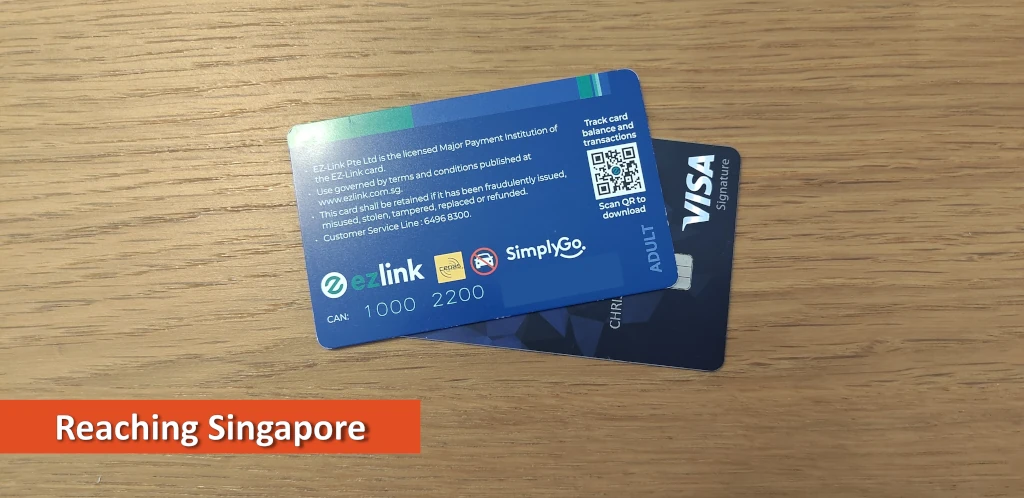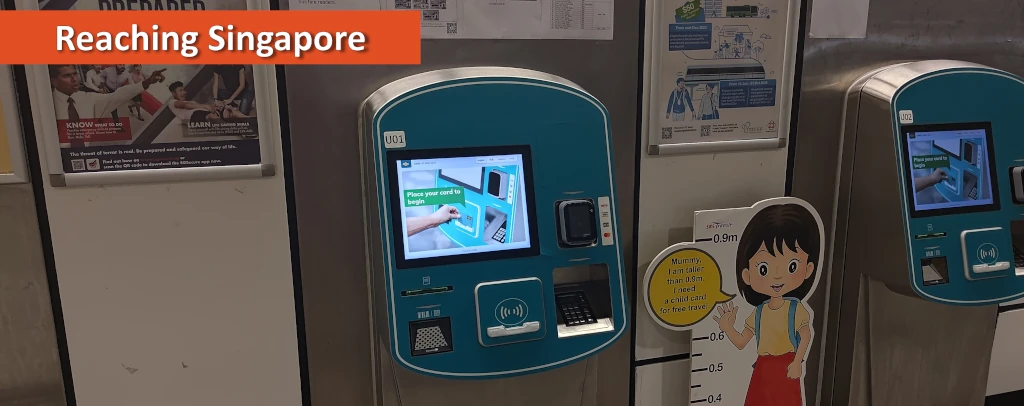How to pay for MRT & bus in Singapore (6 methods compared)
Public transport in Singapore is convenient. Trains (known locally as MRT) and buses cover nearly all of the island - including popular tourist destinations such as Sentosa, Mandai wildlife parks, and Changi Airport.
Credit cards and debit cards - using the Visa or Mastercard networks - are the most popular way to pay for public transport in Singapore. The prepaid SimplyGo EZ Link card is also available to use however it has a non-refundable S$5 card fee upon purchase of a new one.

Public transport fares typically cost between S$1.09 to S$2.37 per journey based on the distance travelled. A journey includes interchanging between buses and/or trains.
A 60 cent fee is added when using a non-Singaporean credit or debit card. This fee is charged per day the card is used on the network regardless of how many journeys were taken in that day.
This guide is part of my series on public transport for visitors in Singapore. In this guide I’ve included:
- Credit cards (Visa and Mastercard)
- Debit cards (Visa and Mastercard)
- Prepaid SimplyGo EZ Link cards (can be purchased at airport)
- Cash (accepted on buses only)
- Payment apps (only Apple Pay and Google Pay, QR codes not accepted)
- Singapore Tourist Pass
This guide focuses on trains and buses. For taxi payment methods, refer to my guide here.
1. Credit Card
Credit cards are the easiest way for visitors to Singapore to pay for bus or MRT journeys. As long as the card is a Visa or Mastercard, and the issuing bank has allowed overseas transactions (most do allow), then your card will work as a ticket on Singapore’s public transport network.
Fares paid by credit card are the same as the SimplyGo card. Each journey typically costs between S$1.09 and S$2.37.
However, a 60 cent fee is added per day when using a non-Singaporean credit card to pay for transport. This fee covers the costs of currency conversion for the public transport fare company in Singapore. It doesn’t matter if you take 1 journey or 7 journeys, the foreign credit card fee is the same 60 cents.
The card issuing bank will also likely charge a currency conversion fee, or use a less-favourable rate to cover the costs of currency conversion. I like to use cards that rebate this fee as frequent flyer miles (look out for cards that give a bonus for overseas transactions).
To use a credit card to pay for Singapore public transport:
- Touch the card to the reader at the fare gate or as you board the bus (ensure there are not multiple Visa/Mastercard cards stacked together)
- Ride the bus/train to your destination
- Tap the same card as you leave the MRT station or step off the bus
Do not mix physical card and Apple/Google Pay when tapping in and out on a bus or train. You will be charged twice the maximum fare, even if it is the same card listed on the app. This is due to the way Apple and Google sit as middle-men in the transaction processing chain.
2. Debit Card
Debit cards issued on the Visa or Mastercard networks will work as a ticket for Singapore bus or MRT journeys. They work same as credit cards from a public transport perspective.
This means that for debit cards:
- Typical costs for a journey is between S$1.09 and S$2.37
- An additional 60 cent charge per day is applied
- Card issuing bank may charge additional foreign currency conversion fees
I do not like using debit cards when I travel to another country as it exposes my savings to fraudulent transactions. However debit cards can be useful in Singapore for helping those without a credit card (e.g. under 18’s) pay for public transport.
3. Prepaid SimplyGo EZ Link card
The prepaid public transport card in Singapore is called SimplyGo EZ Link, however many Singaporeans will refer to it by its original name of EZ Link (pronounced the American way of eee-zee link).
The prepaid card is available to be purchased at the following locations:
- Changi Airport - at the MRT stations or Changi Recommends booths
- Any MRT station across the city
- Convenience stores and some other limited shops (typically those little SIM card shops)
Purchasing an EZ Link card costs S$10 and comes with S$5 of credit, this means there’s a non-refundable S$5 charged for the card itself. Convenience and other retail shops are allowed to charge more for the card that still only comes with S$5 of credit.
Fares on the prepaid card are the same as when paying by credit or debit card. That is, between S$1.09 and S$2.37.
Topping up the EZ Link card can be done with:
- Cash at MRT stations
- Credit card at MRT stations or by using the EZ Link app

Top ups are not usually available at convenience stores (it’s confusing, so as a visitor the easiest way is to not rely on them).
There is a subtle difference between an EZ Link card and a SimplyGo EZ Link card, the latter will not tell you your balance on the reader. Most tourists I talk to will not notice this difference.
4. Cash
Cash is only available as a payment method on Singapore buses. Cash fares cannot be used for MRT rides in Singapore.
Cash fares are more expensive than card payment fares. They start at S$1.90 and can go up to S$3.00 depending on distance travelled.
Exact change should be given to the bus driver. This means you should know your destination before you get on the bus so you can prepare the correct change.
Given all the above, I do not recommend paying by cash for buses in Singapore. Try to pay by credit card or debit card instead if you don’t have an EZ Link card; even with the foreign currency fees it will be cheaper than cash.
5. Payment apps
Google Pay and Apple Pay can be used to pay for MRT and bus rides in Singapore. As long as the payment method is configured to use a credit or debit card, it can be used as a ticket for Singapore buses and MRT.
Youtrip, Revolut, and similar apps can be used for public transport payments. Using a payment card on the Visa or Mastercard network, even if it’s not a physical card, will work on Singapore’s public transport network.
The fare structure is the same as credit or debit cards. A minimum charge of S$1.09 will apply with the maximum fare chargeable being S$2.37. The foreign card fee of 60 cents per day is also added.
Do not mix physical card and Apple/Google Pay when tapping in and out on a bus or train. You will be charged twice the maximum fare, even if it is the same card listed on the app. This is due to the way Apple and Google sit as middle-men in the transaction processing chain.
QR code payments are not supported by Singapore buses or at MRT stations. This means that AliPay and WeChat pay will not work for bus or train rides in Singapore.
6. Singapore Tourist Pass
The Singapore Tourist Pass is a special type of EZ Link card that allows one, two, or three days of unlimited public transport journeys depending on how many days you pay for.
There are four different types of Singapore Tourist Pass:
| Pass Type | Total Cost | Daily Cost |
|---|---|---|
| 1-Day Pass | S$12 | S$12 |
| 2-Day Pass | S$19 | S$9.50 |
| 3-Day Pass | S$24 | S$8 |
| SG Tourist Pass (3 days) | S$29 | S$9.67 |
The Total Cost assumes you refund the pass at an MRT station once the pass has expired. The SG Tourist Pass does not require a refundable deposit (that’s why it’s slightly more expensive).
I do not recommend using the Singapore Tourist Pass. It mas small savings compared to a credit or debit card, and relies on you getting the deposit refund. If you do need the small saving though, it might be worth it.
Example itinerary showing savings:
| Itinerary | Normal Cost | STP Savings |
| Day 1: Bird Paradise, Hawker Centre, National Museum | S$9.52 | S$1.52 |
| Day 2: Botanic Gardens, Haw Par Villa, Gardens by the Bay | S$9.38 | S$1.38 |
| Day 3: Zoo, National Gallery, Airport (one-way) | S$9.44 | S$1.44 |
| Total | S$28.34 | S$4.34 |
Further Reading
For more in my series of guides on getting around Singapore, check out the following:
- How to use buses in Singapore: reachingsingapore.com/singapore-catch-bus-guide
- How to use trains (MRT) in Singapore: reachingsingapore.com/singapore-catch-train-guide
- How to use taxis in Singapore: reachingsingapore.com/singapore-catch-taxi-guide
I used the following references in putting this guide together:

